Hail the Conquering Hero (1944)
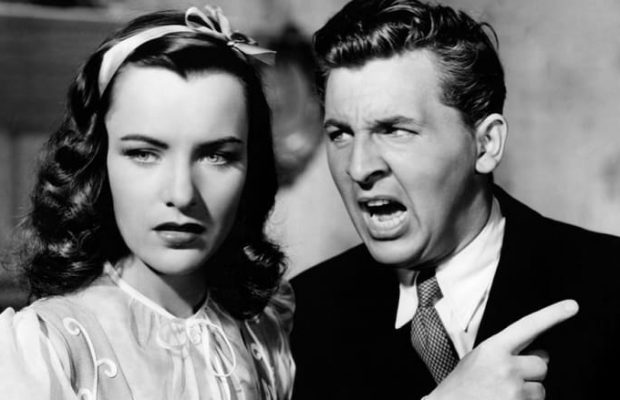
Toronto Film Society presented Hail the Conquering Hero (1944) on Monday, August 11, 1970 in a single bill as part of the Season 22 Summer Series, Programme 5.
“I must admit that Preston Sturges looked every inch a director.” (Andrew Sarris in Interviews with Film Directors)
WHAT DOES A DIRECTOR LOOK LIKE?
The above statement may not come as too much of a surprise to members of T.F.S.’s Summer Series. The truth is, however, that not all directors live up to the public’s image of a director. Being equally as colourful a character as most of his fictional creations, Sturges did; and presumably this was one of the reasons why he was chosen, along with Cecil B. DeMille, to appear as himself in Paramount’s 1942 all-star entertainment, Star Spangled Rhythm (excerpts from which, members of T.F.S. Main Series may remember, were shown last winter in our HOLLYWOOD IN WARTIME Series).
Tonight, in place of the usual Charley Chase comedy to introduce the program, we will be screening a further excerpt from that film which will include those sequences in which Sturges appeared.
Star Spangled Rhythm USA 1942 99 mins b&w 16mm
Production Company: Paramount. Associate Producer: Joseph Sistrom. Director: George Marshall. Script: Harry Tugend. Photography: Leo Tover and Theodor Sparkuhl. Editor: Paul Weatherwax. Art Directors: Hans Dreier and Ernest Fegte. Music: Robert Emmett Dolan. Songs: Johnny Mercer and Harold Arlen – “That Old Black Magic”, “Hit the Road to Dreamland”, “Old Glory”, “A Sweater, a Sarong and a Peekaboo Bang”, “I’m Doing It for Defence”, “Sharp as a Tack”, “On the Swing Shift”, “He Loved Me Till the All-Clear Came”.
Cast: Victor Moore (Pop Webster), Betty Hutton (Polly Judson), Eddie Bracken (Jimmy Webster), Walter Abel (Frisbee), Gil Lamb (Hi-Pockets), Cass Daley (Mimi), Ann Revere (Sarah), Edward Fielding (Mr. Freemont), Edgar Deering (Mac), William Haade (Duffy), Maynard Holmes (Sailor), James Millican (Sailor), Eddie Johnson (Tommy), Arthur Loft (Casey), Boyd Davis (Captain Kinglsey), Eddie Dew (Petty Officer), Rod Cameron (Petty Officer), and guest appearances by Bing Crosby, Bob Hope, Fred MacMurray, FranchotTone, Ray Milland, Dorothy Lamour, Paulette Goddard, Vera Zorina, Mary Martin, Dick Powell, Veronica Lake, Alan Ladd, Rochester, William Bendix, Jerry Colonna, Macdonal Carey, Susan Hayward, Marjorie Reynolds, Betty Rhodes, Dona Drake, Lynne Overman, Gary Crosby, Johnnie Johnston, Ernest Truex, Katherine Dunham, Arthur Treacher, Walter Catlett, Sterling Holloway, Golden Gate Quartette, Cecil B. DeMille, Preston Sturges, Albert Dekkar, Cecil Kellaway, Ellen Drew, Jimmy Lydon, Frances Gifford, Susanna Foster, Robert Presont, Frank Faylen and others.
In order to make sense of the action in tonight’s excerpt, a brief rundown on the plot of Star Spangled Rhythm seems in order.
‘Pop’ Webster (Victor Moore), a ‘Broncho Billy’ type ex-Western star of the silent movies, has been reduced to a job as studio gateman at Paramount Studios. However, he has been leading his sailor son (Eddie Bracken) to believe that he is a big-wig Paramount executive. “When the son comes home on leave and brings his fellow sailors with him it devolve on Polly Judson (Betty Hutton), one of the studio telephone girls, to invent quick scene shifts and impersonations so that the uniformed gatekeeper will appear to his son as the sports-clothed head of the studios.” (Monthly Film Bulletin of the British Film Institute, March 31, 1943) In order to maintain this juggling act it has been necessary to have one of the real Paramount executives, Frisbee (Walter Abel), barred from the lot, since it is his office and status which ‘Pop’ has temporarily taken over.
Sturges appears in a screening-room sequence in which a catchy number sung by Mary Martin and Dick Powell, and having little or nothing in common with Sturges’ style of movie-making, is represented as a scene from his latest picture.
INTERMISSION
Hail the Conquering Hero (1944)
Production Company: Paramount. Director: Preston Sturges. Screenplay: Preston Sturges. Photography: John Seitz. Editor: Stuart Gilmore. Art Direction: Hans Dreier, Haldane Douglas. Music Score: Werner Heymann. Music Director: Sigmund Krumgold. Song: “Home to the Arms of Mother” by Preston Sturges.
Cast: Eddie Bracken (Woodrow Lafayette Pershing Truesmith), Ella Raines (Libby), Raymond Walburn (Mr. Noble), William Demarest (Sergeant), Franklin Pangborn (Chairman of Reception Committee), Elizabeth Patterson (Libby’s Aunt), Georgia Caine (Mrs. Truesmith), Freddie Steele (Bugsy), Bill Edwards (Forrest Noble), Harry Hayden (Doc Bissell), Jimmy Conlin (Judge Dennis), Jimmy Dundee (Corporal), Alan Bridge (Political Boss), Esther Howard (Mrs. Noble), Robert Warwick (Marine Colonel), Len Hendry (Juke), James Damore (Jonesy), Stephen Gregory (Bill), Dewey Robinson (Train Conductor), Victor Potel (Progressive Bandleader), Merrill Rodin (Alfie, Junior Bandleader), Jack Norton (Regular Bandleader), Johnny Sinclair (American Legion Bandleader), Torben Meyer (Mr. Schultz), Chester Conklin (Western Union Man), Arthur Hoyt (Reverend Upperman), George Melford (Sheriff), Frank Moran (Town Painter), Tom McGuire, Philo McCullough, Franklyn Farnum, Kenneth Gibson (Town Councilmen), Paul Porcasi (Manager of Cafe), George Anderson (Bartender), Julie Gibson (Singer), Mildred Harris (Marine Colonel’s wife), Dot Farley (Mamie’s mother), Marjean Neville (Mamie), Maxine Fife (Colonel’s daugher), Pauline Drake (Telephone Operator).
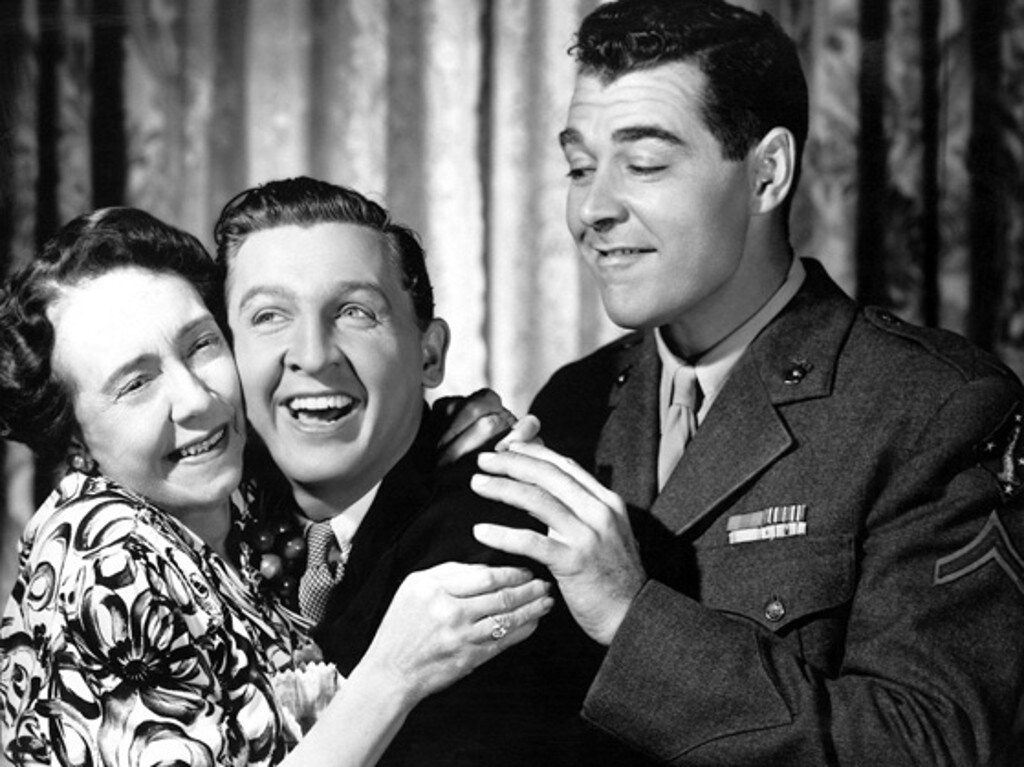
In the year following the production of The Palm Beach Story, Preston Sturges acted as nominal producer of Rene Clair’s I Married a Witch (also shown last winter in T.F.S.’s Main Series), appeared in Star Spangled Rhythm, wrote and directed his third picture in a row starring Joel McCrea, The Great Moment, which was considered a misfire by Paramount, and held up for over a year for re-editing and changes. Then followed two of his richest and most remarkable films, both set, for a change, in small towns, and both starring–and conferring stardom on Eddie Bracken, previously only a popular featured player. The films were The Miracle of Morgan’s Creek (unfortunately not available for our summer series), and tonight’s feature, Hail the Conquering Hero.
Both films were nominated for Best Original Screenplay ‘Oscar’ in 1944, but lost out to Leo McCarey’s Going My Way.
SOME COMTEMPORARY CRITICAL COMMENTS
“Hail the Conquering Hero, the newest cinematic caprice from Preston Sturges…beats a satirical tattoo on the American small town. But it tells a story so touching, so chock-full of human frailties and so rich in homely detail that it achieves a reality transcending the limitations of its familiar slapstick.
“Expertly sandwiched between the pratfalls and the broad pie-throwing burlesque of suburban manners lies a richer comedy idea–the alchemy by which a phoney hero is transmuted from the base metal of conventional heroics to the pure gold of true heroism.
“Woodrow Lafayette Pershing Truesmith (Eddie Bracken), an awkward, befuddled but eager son of suburbia, is the ‘hero’. Given a rousing sendoff by fellow citizens of Oakridge, California, he marches confidently off to war, only to be ignominiously bounced out of Marine boot camp because of his chronic hay fever. Burning with shame, he thinks of his father, Hinky Dink Truesmith, a hero who died gloriously at Belleau Wood on the day his son was born; of his mother, so proud and radiant, weeping on the station platform; of the brass bands tootling and banners proudly declaiming: ‘Like father, like son’.
“So mortified is Hinky Dink’s boy that he heroically hoodwinks his mother into thinking he really is leathernecking it on Guadalcanal, writes his girl (Ella Raines) that he has fallen in love with someone else and goes miserably off to work in a shipyard.
“What happens when six real Marines take Woodrow in hand and forcibly escort him home, his ill-fitting uniform bristling with extemporaneous decorations, is the stuff which makes Hail the Conquering Hero one of the year’s most ingratiating pictures. When grateful townspeople solemnly burn the mortgage on the old Truesmith homestead and make plans to erect a suitable monument in the town square, Woodrow’s misery seems to have reached its bearable limit. But it touches new depths when, in one of the most uproarious political campaigns in cinema history, the desperately reluctant Woodrow is nominated for Mayor.”
James Agee, Time, August 21, 1944 as quoted in Agee on Film
“The film is Sturges at his most vigorous. His script takes almost everything sacred to Americans–mother love, patriotism, heroism, politics–and laughs at them all; but then, with well-known Sturges cynicism, deftly puts them back on their pedestals. The same tremendous gusto permeates the direction…Bracken scores as the bewildered and protesting hero, but his success is equalled by many of the cast in equally improbably parts–William Demarest as an electioneering sergeant, Freddy Steele as a sentimental orphan, Franklin Pangborn, Raymond Walburn and others”.
K.F.B., Monthly Film Bulletin of the British Film Institute, December 31, 1944
By the end of Sturges’ incredible five year streak of sustained creative brilliance as both writer and director (from The Great McGinty in 1939 to Hail the Conquering Hero in 1944) the more ‘serious’ critics were submitting his films to the most intense critical scrutiny and becoming more and more worried and frustrated by Sturges’ ambivalence and refusal to conform to their ideas of a serious artist.
James Agee, on the whole one of the most perceptive critics of Sturges, was always at his most ponderous writing in The Nation:
“The Miracle of Morgan’s Creek, the new Preston Sturges film, seems to me funnier, more adventurous, more abundant, more intelligent, and more encouraging than anything that has been made in Hollywood for years. Yet the more I think of it, the less I esteem it”.
James Agee, The Nation, February 5, 1944, as quoted in Agee on Film
“Hail the Conquering Hero is a bewilderingly skilful picture, and the skill is used no more brilliantly to tell the story than to cover up the story’s weaknesses and those of its author, Preston Sturges.
“I’d like not to be so owlish about a picture which gave me so much more delight than displeasure, but now that Sturge is being compared, I am told, with people like Voltaire–there are semi-defensible reasons to compare him with Shakespeare, for that matter–I think there is some point in putting on the brakes. Most certainly Sturges has fine comic and satiric gifts, and knows how to tell more truth than that when he thinks it expedient; but he seldom does. The film has enough themes for half a dozen first-rate American satires–the crippling myth of the dead heroic father, the gentle tyranny of the widowed mother, the predicament of the only child, the questionable nature of most heroism, the political function of returning soldiers, these are just a few; I suppose in a sense the whole story is a sort of ‘Coriolanus’ on all four. But not one of these themes is honored by more attention than you get from an incontinent barber in a railway terminal, and the main theme, which I take to be a study of honor, is dishonored by every nightingale in Sturges’ belfry.
“They are wonderful as comedies and they are wonderfully complex and ingenious; they seem to me also wonderfully, uncontrollably, almost proudly corrupt, vengeful, fearful of intactness and self-commitment; most essentially, they are paradoxical marvels of self-perpetuation and self-destruction; their mastering object, aside from success, seems to be to sail as steeply into the wind as possible without for an instant incurring the disaster of becoming seriously, wholly acceptable as art.”
James Agee, The Nation, September 23, 1944, as quoted in Agee on Film
“The Miracle of Morgan’s Creek (1943) and Hail the Conquering Hero (1944) satirised the follies of wartime–military romance, hero worship, ‘Mom’ idolatry, and small-town politics. In writing and direction these are brilliant films. But their essential statement–and they make a statement–is that human beings are dopes. Winning, lovable, amusing dopes, to be sure, but dopes none the less, and a man is a fool who says otherwise or tries to do anything about it. This is, of course, the essence of what passes for philosophy in Hollywood, but no one before has ever articulated it so boldly, perhaps because no one else had the talent to sugarcoat the pill and get away with it.
“Sturges has the talent. He can make you laugh explosively for two hours. He has a style and resourcefulness not seen in film comedies since the early days of Sennett, Chaplin, and Keaton. But his is an inverse kind of satire. He is not interested in crushing infamy, but in recording it and implying that nothing can be done about it.”
Richard Griffith, The Film Till Now
“He must be one of the few film-makers ever to have been publicly psychoanalysed by a critic. The critic was James Agee, who wrote of Sturges with a kind of nagging, apprehensive affection, generous towards his talent but continually disturbed by his apparent lack of conscience.
“…What so exasperated Agee was Sturges’ extension of his gay opportunism into more serious areas. The supremely equivocal ending of Hail the Conquering Hero is a case in point…This ending has been interpreted as a really catastrophic sell-out, with Mother and the Marines triumphant, simple honesty vindicated, and hardly a dry eye in the house. Or, equally validly, since the scenes are shot both with and against the grain of their content, it has been seen as an expression of a basic contempt. There is no pretence that a town which would elect poor, blundering Woodrow is anything but out of its mind; and consequently this is only a happy ending if you think it is…His films fade out into a series of Cheshire cat grins: not the expression on the face of the work ‘wholly acceptable as art’.”
Penelope Houston, Preston Sturges, Sight and Sound, Summer 1965
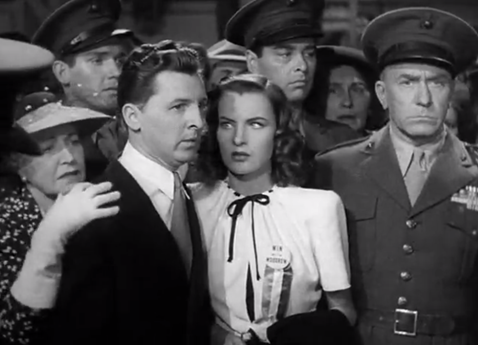
IN THE COMIC TRADITION
“Sturges performs as an agile Puck who plucks at the threadbare sleeves of average sentiment, pulls the most respectably knotted tie or ribbon awry, and douses us with cold water without somehow getting our dander up. There is even a trace of acid in the liquid; it spots publicly cherished notions and practices, and yet keeps us rolling in the aisles. If he is jester-laureate to the American people, he has earned the title because his mimicry is faultless, and because, like all expert wearers of motley, he knows how to whirl us about while he slapsticks us. Bosley Crowther has aptly described this as Sturges’ ‘irrepressible impudence’. But set in his clown’s make-up are eyes that are alternately sharp and moistly warm, and they leave us wondering whether we can make him out. It is this small challenge to curiosity, this uncertainty as to his intention that makes the difference between his tomfoolery on the screen and most men’s. Perhaps that is also why he gets by the Hays Office where others fail. This feat was indeed the greatest miracle in his The Miracle of Morgan’s Creek! Does not The Miracle play hob with conventional views on marriage and legitimacy, and yet leave the public content? Does not Hail the Conquering Hero constitute the brashest travesty on hero-worship since “The Playboy of the Western World”, and yet salve audiences with compassion for the 4F Eddie Bracken hero? The cynic or the social critic can find aid and comfrot in Sturges’ work, if not perhaps without suspicion that the nimble fellow may not be actually so tough-minded, while the sentimentalist is sure to be gratified–though not without the disquieting feeling that his leg is being pulled.”
John Gassner, “A Film Play Annual”, his introduction to “Best Film Plays of 1943-44”, in which both The Miracle of Morgan’s Creek and Hail the Conquering Hero were included
Many critics have pegged Sturges as an opportunistic cynic and left it at that–but not all:
“He mingled sophistication and crudity as do the great clowns…There was an unholy glee in those Sturges comedies which burst gratefully upon a world preoccupied with survival.
“The curious thing about this caricaturist–in the sense that includes Rowlandson and Daumier–with his packed, active screen, is that he should have quite a streak of sentiment. It isn’t sentimentality. It leaks out not only in parodies, which cherish some of the feelings they mock, but in efforts to express or at least unearth a love of humanity. That Sturges scarcely succeeded in this does not in itself fatally reduce him: indeed it is the fate and inspiration of most comedians.”
G.W. Stonier, Sight and Sound, Summer & Autumn, 1959
Referring to the final sequences of Sullivan’s Travels in which Sturges presents an apologia for sheer entertainment as opposed to ponderous if well-meant social comment in movies, Penelope Houston asks:
“Was Sturges here showing us the heart Agee suspected he hadn’t got? Or was he simply playing with an idea, and barnstorming it through when it got too hot to handle? Because Sturges was the great equivocator, we never quite trust him. He has trained us to keep up our guard against his own seriousness.
“…His defences were built up in depth; His favourite approach was the oblique and glancing one, with all the retreats into burlesque left open. His films give the impression of running on sheer, undiluted nervous energy rather than on thought. Confronted with an idea to be followed straight through, Sturges brought his elaborate defence mechanisms into play. Yet for a man who is supposed to have thought only of success, he was extraordinarily preoccupied with the byways of failure, with age and decay, and that wistful realisation of their own uselessness that suddenly hits his most sympathetic characters. His films are sometimes nearly serious, and always wildly funny.”
Penelope Houston, “Preston Sturges”, Sight and Sound, Summer 1965
STURGES IN PERSON
Andrew Sarris, whose description of Sturges as “the Breughel of American comedy directors”, was one of the less debatable comparisons with cultural figures of the past, interviewed Sturges in New York in 1957.
“…Like most directors, Sturges did not go to movies very often. Of his own films, he felt that Hail the Conquering Hero had ‘less wrong with it’ than any of his other films. The producers wanted to remove Ella Raines after the first rushes of Hero, but Sturges refused to consider a substitute. He was still scornful of Paramount for humiliating Vera Zorina in For Whom the Bell Tolls by replacing her with Ingrid Bergman after the hapless dancer had cut her hair for the part of Maria.”
Andrew Sarris, “Interviews with Film Directors”
Significantly Ella Raines gives one of her most effective, and touching, performances in tonight’s feature.
In Arkadin’s FILM CLIPS column in Sight and Sound (Spring 1969) Veronica Lake cites Sturges’ gentleness and generosity and credits Sturges with having faith in her and providing her with the two best roles of her career: in Sullivan’s Travels and I Married a Witch. Concerning the latter:
“…after three days he bowed out [as producer] and let Rene [Claire] do it entirely his own way. That was very Preston. He wanted Rene to get the chance to make the film and he wanted me to have the chance to be in it, so he took the responsibility himself to bring these two things about, and then quietly bowed out when it was all set up. He was a marvelllous person, and I loved him dearly.”
For a full-fledged eulogy of Sturges, following his death in 1959, see Nel King’s piece on page 185 of that year’s Summer & Autumn issue of Sight and Sound.
Notes by Doug Davidson
FILMOGRAPHY
Born Edmund Preston Biden Sturges in Chicago, August 29, 1898; died in New York, August 5, 1959.
1930 – The Big Pond (Hobart Henley)
Dialogue; from the play by G. Middleton and A.E. Thomas.
1930 – Fast and Loose (Fred Newmeyer)
Dialogue; from the novel, “The Best People”, by D. Gray and A. Hopwood.
1931 – Strictly Dishonorable (John M. Stahl)
Based on his play.
1933 – The Power and the Glory (William K. Howard)
Original story and screenplay.
1933 – Child of Manhattan (Edward Buzzell)
Based on his play.
1934 – Thirty Day Princess (Marion Gering)
Screenplay, with Frank Partos; based on the novel by Clarence B. Kelland.
1934 – We Live Again (Rouben Mamoulian)
Adaptation, with Maxwell Anderson and Leonard Praskins, of the novel “Resurrection”, by Leo Tolstoi.
1935 – The Good Fairy (William Wyler)
Screenplay; based on the play by Ferenc Molnar.
1935 – Diamond Jim (A. Edward Sutherland)
Screenplay; based on the novel by Parker Morell.
1937 – Hotel Haywire (George Archainbaud)
Original story and screenplay.
1937 – Easy Living (Mitchell Leisen)
Screenplay; based on a story by Vera Caspary.
1938 – The Port of the Seven Seas (James Whale)
Screenplay; based on the play, “Fanny” by Marcel Pagnol.
1938 – If I Were King (Frank Lloyd)
Screenplay; based on the play by J.H. McCarthy.
1940 – Remember the Night (Mitchell Leisen)
Original story and screenplay.
1940 – The Great McGinty
Direction, original story and screenplay.
1940 – Christmas in July
Direction, original story and screenplay.
1941 – The Lady Eve
Direction and screenplay; based on a story by Monkton Hoffe.
1941 – Sullivan’s Travels
Direction, original story and screenplay.
1942 – The Palm Beach Story
Direction, original story and screenplay.
1942 – I Married a Witch (Rene Claire)
Producer (uncredited)
1942 – Star Spangled Rhythm (George Marshall)
Brief acting appearance as himself.
1944 – The Miracle of Morgan’s Creek
Direction, original story and screenplay.
1944 – Hail the Conquering Hero
Direction, original story and screenplay.
1944 – The Great Moment
Direction and screenplay; from the book by Rene Fulop-Miller.
1947 – I’ll Be Yours (William A. Seiter)
Remake of his screenplay for The Good Fairy.
1948 – Unfaithfully Yours
Production, direction, original story and screenplay.
1949 – The Beautiful Blonde from Bashful Bend
Production, direction and screenplay; based on a story by Earl Felton.
1950 – Mad Wednesday (Originally released in 1946 as The Sin of Harold Diddlebock)
Direction, production, original story and screenplay.
1951 – Strictly Dishonorable (Melvin Frank & Norman Panama)
Based on his play, previously filmed in 1931.
1955 – Le Carnet du Major Thompson (The French They are a Funny Race)
Direction and screenplay; based on the novel by Pierre Daninos.
1956 – The Birds and the Bees (Norman Taurog)
Collaborated with Sidney Sheldon on a reworking of his screenplay for The Lady Eve.
1958 – Paris Holiday (Gerd Oswald)
Brief acting appearance in a characterization evocative of Sacha Guitry.
1958 – Rock-a-Bye Baby (Frank Tashlin)
Original story.
Preston Sturges’ Credits Compiled Peter Poles


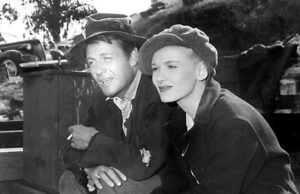
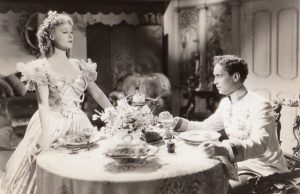






Leave a Reply